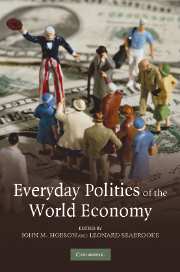Book contents
- Frontmatter
- Contents
- List of tables
- List of contributors
- Acknowledgements
- 1 Everyday IPE: revealing everyday forms of change in the world economy
- Part I Regimes as cultural weapons of the weak
- 2 The agency of labour in global change: reimagining the spaces and scales of trade union praxis within a global economy
- 3 The agency of peripheral actors: small state tax havens and international regimes as weapons of the weak
- 4 Southern sites of female agency: informal regimes and female migrant labour resistance in East and Southeast Asia
- Part II Global economic change from below
- Part III Bringing Eastern agents in
- Bibliography
- Index
3 - The agency of peripheral actors: small state tax havens and international regimes as weapons of the weak
Published online by Cambridge University Press: 22 September 2009
- Frontmatter
- Contents
- List of tables
- List of contributors
- Acknowledgements
- 1 Everyday IPE: revealing everyday forms of change in the world economy
- Part I Regimes as cultural weapons of the weak
- 2 The agency of labour in global change: reimagining the spaces and scales of trade union praxis within a global economy
- 3 The agency of peripheral actors: small state tax havens and international regimes as weapons of the weak
- 4 Southern sites of female agency: informal regimes and female migrant labour resistance in East and Southeast Asia
- Part II Global economic change from below
- Part III Bringing Eastern agents in
- Bibliography
- Index
Summary
In the last decade core states acting through international organisations have attempted to set global standards to combat financial crime, shore up the stability of the global financial architecture and especially regulate ‘harmful’ international tax competition, targeting in each case small state tax havens. In response the small states in the sights of multilateral regulatory initiatives have successfully employed ‘weapons of the weak’, particularly ‘rhetorical action’, in subverting and reversing core states’ rhetorical justifications for the inter-related campaigns. Through normative appeals, argument and rhetoric based on deeply held beliefs concerning the virtues of competition and principles such as inclusive, non-discriminatory standard setting, small states have undermined the legitimacy of core state proposals. These global regulatory campaigns came to be perceived as employing coercive methods and embodying double standards in pursuit of anti-competitive goals. With reference to the Organisation for Economic Co-operation and Development (OECD) harmful tax competition campaign in particular, this chapter examines how a coalition of the world's richest and most powerful states has been defeated by an unlikely clutch of small island states and mediaeval hold-overs through what the editors refer to as a ‘mimetic challenge’.
In discussing international organisations, norms and power politics, the chapter deals with central issues for the field of international relations, including how political factors shape the global economy, as well as governance and authority relationships in the international system generally.
- Type
- Chapter
- Information
- Everyday Politics of the World Economy , pp. 45 - 62Publisher: Cambridge University PressPrint publication year: 2007



